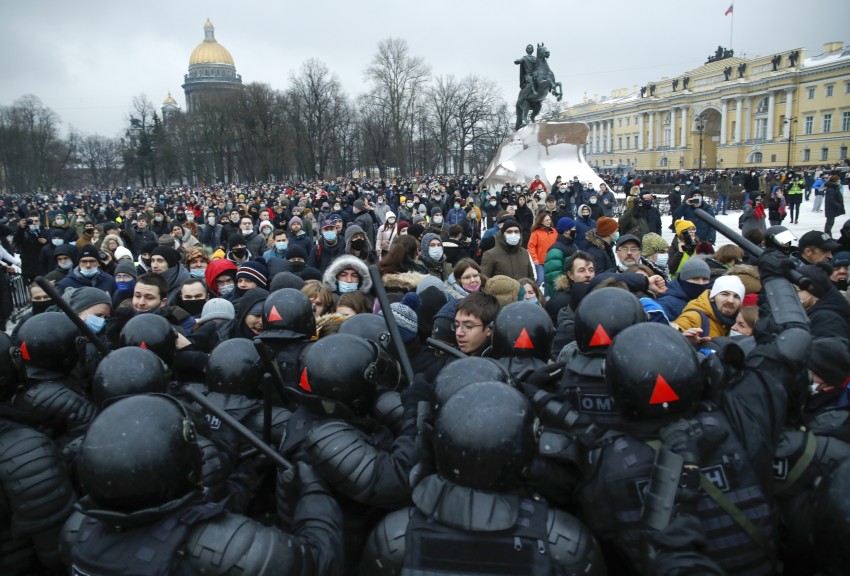Russian police arrest a lot more than 3,000 at protests demanding Navalny's release
24 January, 2021

Russian police arrested a lot more than 3,000 persons Saturday on nationwide protests challenging the release of opposition leader Alexei Navalny, the Kremlin's most prominent foe, in respect to a group that matters political detentions.
The protests in scores of cities in temperatures only minus-50 C (minus-58 F) highlighted how Navalny has generated influence far beyond the political and cultural centers of Moscow and St. Petersburg.
In Moscow, around 15,000 demonstrators gathered in and around Pushkin Square in the location middle, where clashes with police broke out and demonstrators were roughly dragged off by helmeted riot officers to police buses and detention trucks. Some had been beaten with batons.
Navalny's wife Yulia was among those arrested.
Law enforcement eventually pushed demonstrators from the square. Thousands after that regrouped along a broad boulevard about a kilometer (half-mile) apart, many of them throwing snowballs at the authorities before dispersing.
Some later visited protest near the jail where Navalny is held. Law enforcement made an undetermined number of arrests there.
The protests stretched across Russia's vast territory, from the island city of Yuzhno-Sakhalinsk north of Japan and the eastern Siberian city of Yakutsk, where temperatures plunged to minus-50 Celsius, to Russia's more populous European cities. Navalny and his anti-corruption plan have made an considerable network of support despite established government repression and becoming routinely ignored by point out media.
"The situation gets worse and worse, it's total lawlessness," said Andrei Gorkyov, a protester in Moscow. "And if we stay silent, it'll go on forever."
The OVD-Facts group, which monitors political arrests, said at least 1,167 persons were detained in Moscow and a lot more than 460 at another large demonstration in St. Petersburg.
Overall, it said 3,068 people had been arrested in a few 90 places, revising the count downward from its before report of 3,445. The group didn't give an explanation for its revision. Russian law enforcement didn't provide arrest figures.
Undeterred, Navalny's supporters needed protests again subsequent weekend.
Navalny was arrested on Jan. 17 when he came back to Moscow from Germany, where he had spent five months dealing with a extreme nerve-agent poisoning that he blames on the Kremlin and which Russian authorities deny. Authorities claim his stay in Germany violated terms of a suspended sentence in a 2014 criminal conviction, while Navalny says the conviction was for made-up charges.
The 44-year-old activist established fact nationally for his reviews on the corruption that has flourished under President Vladimir Putin's government.
His wide support places the Kremlin in a strategic bind - officials are apparently unwilling to back down by letting him head out free, but keeping him in custody risks more protests and criticism from the West.
In a statement, the U.S. STATE DEPT. condemned "the usage of harsh methods against protesters and journalists this weekend in cities throughout Russia" and named on Russian authorities to promptly release Navalny and all those detained at protests.
Navalny faces a courtroom hearing in early February to determine whether his sentence found in the criminal case for fraud and money-laundering - which Navalny says was politically motivated - is converted to 3 1/2 years behind bars.
Moscow police on Thursday arrested three best Navalny associates, several of whom were later jailed for intervals of nine and 10 days.
Navalny fell right into a coma while aboard a domestic air travel from Siberia to Moscow on Aug. 20. He was transferred from a hospital in Siberia to a Berlin hospital two days soon after. Labs in Germany, France and Sweden, and studies by the business for the Prohibition of Chemical Weapons, proven that he was exposed to the Soviet-period Novichok nerve agent.
Russian authorities insisted that the doctors who treated Navalny in Siberia before he was airlifted to Germany found no traces of poison and also have challenged German officials to provide proof his poisoning. Russia refused to available a full-fledged criminal inquiry, citing too little evidence that Navalny was poisoned.
Previous month, Navalny released the recording of a telephone call he reported he made to a man he described as an alleged member of several officers of the Government Security Service, or FSB, who purportedly poisoned him on August and then tried out to cover it up. The FSB dismissed the documenting as fake.
Navalny is a thorn found in the Kremlin's side for ten years, unusually durable within an opposition activity often demoralized by repressions.
He has been jailed repeatedly in connection with protests and twice was convicted of financial misdeeds found in conditions that he said were politically motivated. He experienced significant eye destruction when an assailant threw disinfectant into his face. He was extracted from jail to a hospital in 2019 with an illness that authorities said was an allergic attack but which various suspected was a poisoning.
Source: japantoday.com
TAG(s):
